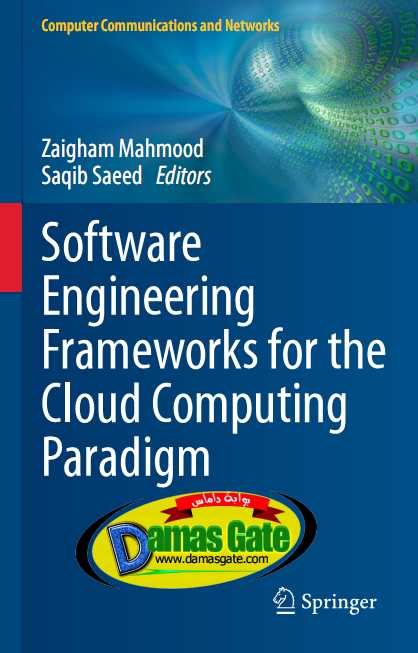Software Engineering Frameworks for the Cloud Computing Paradigm

Preface
Overview
Software engineering is a well-established discipline for the design and development
of large-scale software systems. It is a staged process that follows a software development
life cycle (SDLC) consisting of requirements, design and development phases. Many
methodologies and frameworks also exist for such developments, and, depending on the
application domain, there are proven function-oriented, object-oriented and component-based
methodologies as well as service-oriented and agile frameworks. With the emergence
of cloud computing, however, there is a need for the traditional approaches to software
construction to be adapted to take full advantageof the cloud technologies.
Cloud computing is an attractive paradigm for business organisations due to the
enormous benefi ts it promises, including savings on capital expenditure and availability
of cloud-based services on demand and in real time. Organisations can self- provision software
development platforms, together with infrastructure if so required, to develop
and deploy applications much more speedily. Since the cloud environment
is dynamic, virtualised, distributed and multi-tenant, necessary characteristics
that cloud-enabled software must exhibit need to be inherently built into the software
systems. This is especially so if the software is to be deployed in the cloud environment
or made available for access by multiple cloud consumers. In this context, it is imperative
to recognise that cloud SDLC is an accelerated process and that software development
needs to be more iterative and incremental. Also, the application architecture must provide
characteristics to leverage cloud infrastructure capabilities such as storage connectivity
and communications. It is important that the chosen frameworks are suitable for fast cycle
deployments. Methodologies must also ensure satisfaction of consumer demands of performance,
availability, security, privacy, reliability and, above all, scalability and multi-tenancy.
All this suggests that software architects require a shift in mindset and need to adapt to new approaches
to design and deployment so that software systems are appropriate for cloud environments.
Software Engineering Frameworks for the Cloud Computing Paradigm
This book presents the latest research on Software Engineering Frameworks for the Cloud Computing Paradigm, drawn from an international selection of researchers and practitioners.
The book offers both a discussion of relevant software engineering approaches and practical guidance on enterprise-wide software deployment in the cloud environment, together with real-world case studies. Features: presents the state of the art in software engineering approaches for developing cloud-suitable applications; discusses the impact of the cloud computing paradigm on software engineering; offers guidance and best practices for students and practitioners; examines the stages of the software development lifecycle, with a focus on the requirements engineering and testing of cloud-based applications; reviews the efficiency and performance of cloud-based applications; explores feature-driven and cloud-aided software design; provides relevant theoretical frameworks, practical approaches and future research directions.
English -- ISBN: 1447150309 -- 2013 -- PDF -- 372 pages -- 6,1 MB
Download
*

Preface
Overview
Software engineering is a well-established discipline for the design and development
of large-scale software systems. It is a staged process that follows a software development
life cycle (SDLC) consisting of requirements, design and development phases. Many
methodologies and frameworks also exist for such developments, and, depending on the
application domain, there are proven function-oriented, object-oriented and component-based
methodologies as well as service-oriented and agile frameworks. With the emergence
of cloud computing, however, there is a need for the traditional approaches to software
construction to be adapted to take full advantageof the cloud technologies.
Cloud computing is an attractive paradigm for business organisations due to the
enormous benefi ts it promises, including savings on capital expenditure and availability
of cloud-based services on demand and in real time. Organisations can self- provision software
development platforms, together with infrastructure if so required, to develop
and deploy applications much more speedily. Since the cloud environment
is dynamic, virtualised, distributed and multi-tenant, necessary characteristics
that cloud-enabled software must exhibit need to be inherently built into the software
systems. This is especially so if the software is to be deployed in the cloud environment
or made available for access by multiple cloud consumers. In this context, it is imperative
to recognise that cloud SDLC is an accelerated process and that software development
needs to be more iterative and incremental. Also, the application architecture must provide
characteristics to leverage cloud infrastructure capabilities such as storage connectivity
and communications. It is important that the chosen frameworks are suitable for fast cycle
deployments. Methodologies must also ensure satisfaction of consumer demands of performance,
availability, security, privacy, reliability and, above all, scalability and multi-tenancy.
All this suggests that software architects require a shift in mindset and need to adapt to new approaches
to design and deployment so that software systems are appropriate for cloud environments.
Software Engineering Frameworks for the Cloud Computing Paradigm
This book presents the latest research on Software Engineering Frameworks for the Cloud Computing Paradigm, drawn from an international selection of researchers and practitioners.
The book offers both a discussion of relevant software engineering approaches and practical guidance on enterprise-wide software deployment in the cloud environment, together with real-world case studies. Features: presents the state of the art in software engineering approaches for developing cloud-suitable applications; discusses the impact of the cloud computing paradigm on software engineering; offers guidance and best practices for students and practitioners; examines the stages of the software development lifecycle, with a focus on the requirements engineering and testing of cloud-based applications; reviews the efficiency and performance of cloud-based applications; explores feature-driven and cloud-aided software design; provides relevant theoretical frameworks, practical approaches and future research directions.
English -- ISBN: 1447150309 -- 2013 -- PDF -- 372 pages -- 6,1 MB
Download
*